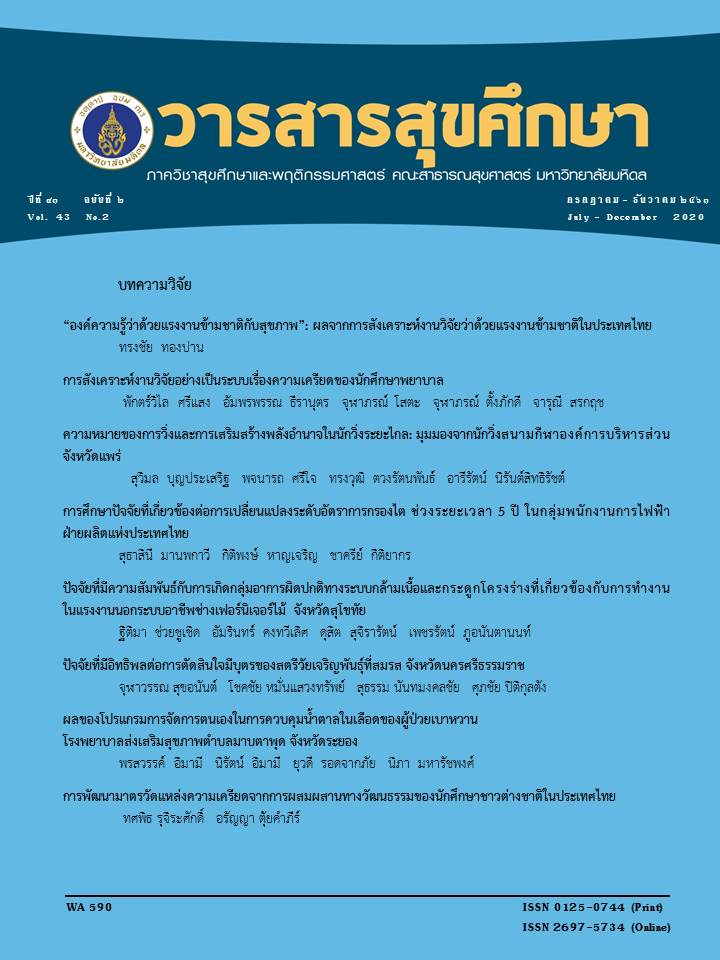Meaning of Running and the Empowerment in Long Distance Runners: The Runners’ Perspective at Phrae Provincial Administrative Organization Stadium
Keywords:
Running, Empowerment, Exercise, Long distance runnerAbstract
This study aims to understand the meaning of the running and to explain transitional process to the new running state of the long-distance runners with the concept of empowerment. This descriptive study was conducted to collect qualitative data by using participatory observation and in-depth interview. Eleven key informants, including 3 occasional runners, 5 regular runners and 3 insider runners, were practiced at Phrae provincial administrative organization stadium. The meaning of running are enjoyable activity or experiences were given by the occasional runners, healthy and life experiences were given by the regular runners and routine or part of daily life were given by the insider runners. The process of being long-distance runner are included as follows: to set up goal, to prepare and continuously practice running, to join running competition, to be a member and/or to position status in the society of runners. The training processes to be a long-distance runner can empower the individual to achieve self-confidence and further encourage the runner aims for more challenging goal. The runners have not only a higher running performance but also life management skill with self-respectfulness.
References
International Association of Athletics Federations. Competition rules 2018-2019 [Internet]. 2017 [cited 2018 Feb 12]. Available from: http://www.iaaf.org
สมาคมกีฬากรีฑาแห่งประเทศไทยในพระบรมราชูปถัมภ์. กรีฑาประเภทถนน [อินเทอร์เน็ต]. [เข้าถึงเมื่อ 1 เมษายน 2561]. เข้าถึงได้จาก: http://www.aat.or.th/home/index.php?option=com_content&view=category&layout=blog&id=8&Itemid=152.
หลักเบื้องต้นของการกรีฑา. กรุงเทพฯ: ยูไนเต็ดท์บุ๊คส์; 2530.
Green BC, Jones I. Serious leisure, social identity and sport tourism. Sport Soc 2005;8(2):164–181.
เจริญ กระบวนทัศน์. หลักการและเทคนิคการฝึกกรีฑา. กรุงเทพฯ: สำนักพิมพ์มหาวิทยาลัยเกษตรศาสตร์; 2545.
Smith SL. Athletes, runners, and joggers: participant-group dynamics in a sport of “individuals”. Sociol Sport J 1998;15:174-192.
Shipway R, Holloway I, Jones I. Organisations, practices, actors, and events: exploring inside the distance running social world. Int Rev Sociol Spor 2013;48(3):259-276.
Shipway R, Holloway I. Running free: Embracing a healthy lifestyle through distance running. Perspect. Public Health 2010;130(6):270-276.
Woodall J, Raine G, South J, Warwick-booth L. Empowerment and health & well-being: evidence review [Internet]. Centre for Health Promotion Research, Leeds Metropolitan University; 2010 [cited 2018 Mar 10]. Available from: http://eprints.leedsbeckett.ac.uk/2172/.
วรรณดี สุทธินรากร. การวิจัยเชิงคุณภาพ: การวิจัยในกระบวนทัศน์ทางเลือก. กรุงเทพฯ: สยามปริทัศน์; 2556.
Cook S, Shaw J, Simpson P. Jography: exploring meanings, experiences and spatialities of recreational road-running. Mobilities 2016;11(5):744-769.
วิโรจน์ สุทธิสีมา, ดวงกมล ชาติประเสริฐ. การสื่อสารกับวาทกรรมการวิ่งในสังคมไทย. วารสารนิเทศศาสตร์ 2558;33(3):46-65.
ณัชชา รัตนสัค. การให้ความหมายต่อการวิ่งและแรงจูงใจในการเข้าร่วมงานวิ่ง: ศึกษาเฉพาะผู้ที่เคยเข้าร่วมงานวิ่ง. วารสารธรรมศาสตร์ 2562;38(2):101-125.
Majcen VM. “It’s More Than the Running” The psychosocial impact of a marathon-training program on midlife woman [Thesis]. Ontario: York University; 2007.
สุพรรณี กาวีละ, มณฑา เก่งการพานิช, ธราดล เก่งการพานิช, ศรัณญา เบญจกุล. พฤติกรรมการออกกำลังกายของพนักงานโรงงานอุตสาหกรรม กรุงเทพมหานคร. วารสารสุขศึกษา 2556;36(1):81-93.
Boudreau AL, Giorgi B. The experience of self-discovery and mental change in female novice athletes in connection to marathon running. J. Phenomenol. Psychol 2010;41(2):234-267.



